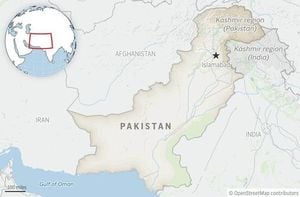California’s raw milk industry is facing significant turmoil following alarming outbreaks of bird flu on dairy farms, particularly affecting Raw Farm, the state’s leading producer of raw milk. The Fresno County farm has temporarily halted sales after state officials detected the avian influenza virus among its herd, marking the latest incident amid widespread concerns over food safety and public health.
The scene at Raw Farm has been tense. On November 27, the California Department of Public Health notified local officials about the detection of the bird flu virus from retail samples of Raw Farm’s milk. This alarming news followed the prior identification of the virus which triggered the first recall on November 24. The affected batches of milk, earmarked with lot codes 20241109 (best by November 27, 2024) and 20241119 (best by December 7, 2024), eventually spurred the state to quarantine the farm, effectively halting its operations.
Mark McAfee, the CEO of Raw Farm, remains optimistic even amid the chaos. He states none of the cows appear visibly ill, which suggests they might be asymptomatic carriers shedding the virus. This aspect raises questions about how the infection spreads and what risks are posed to consumers. Despite fresh recalls, McAfee insists the risk from contaminated raw milk is manageable, claiming previous test results showed only dead virus particles, not live infections. His stance, nonetheless, has not gone without scrutiny.
Reactions from the public and health experts regard McAfee’s claims with skepticism. For one, several documents circulated by McAfee, citing research and studies, argue bird flu-contaminated raw milk does not significantly pose health risks. Some references even included dubious chatbot responses which inaccurately suggested raw milk’s components might deactivate influenza viruses—a theory without sufficient scientific backing.
Studies indicate otherwise, showing raw milk from infected cows can harbor highly infectious strains of the virus, prompting health officials to send out urgent warnings about raw milk consumption. The California health department highlighted the dangers of consuming raw milk containing the virus, stating: "Drinking or accidentally inhaling raw milk containing bird flu virus may lead to illness. Symptoms of infection could resemble those of regular flu, including sore throat, cough, and more serious respiratory issues."
What's more, evidence suggests substantial risks of transmission via milk have been substantiated through various cases. Reports noted at least 34 dairy workers across the United States have contracted H5N1 after handling infected dairy products, mainly through exposure to milk. This reality weighs heavily on those who prefer raw dairy products.
Despite mounting health warnings, the raw milk market thrives as advocates claim significant personal health benefits. Consumers like Raquel Cordaway from Antioch are vocal about their support for raw milk, emphasizing nutritional advantages over potential risks even amid recent recalls. "I understand the risks, but for me and my family, the nutrition I get from raw dairy is unmatched. It is my liquid protein," Cordaway expressed, encapsulating the mixed sentiments among consumers faced with health warnings.
McAfee's optimism about the raw milk industry is also reflected by business dynamics with the potential upcoming leadership changes. He is reportedly tied to political movements advocating for raw milk policies with developments hinting at potential shifts under new health department appointments. One press package circulated mentions connections to Robert F. Kennedy Jr., who strongly supports raw milk consumption and is speculated to take on key positions influencing dairy policy.
Meanwhile, the quarantine's duration remains uncertain, but state regulators haven’t ruled out extending it, noticing the considerable impact of avian influenza across California’s dairy sector. To date, nearly half of the state’s 1,100 dairy operations—461 farms—have been infected, long jeopardizing the livelihoods of many within the industry. Stateside, the dairy community is grappling with overall industry health, production challenges, and consumer confidence.
For now, those concerned about bird flu's zoonotic potential and raw milk's safety are keeping their fingers crossed as California's dairy farms struggle to return to normal. The potential ramifications of the current crisis highlight the dangers of raw milk consumption, especially unpasteurized varieties, as it continues to skirt the fine line between health benefits and associated risks.



